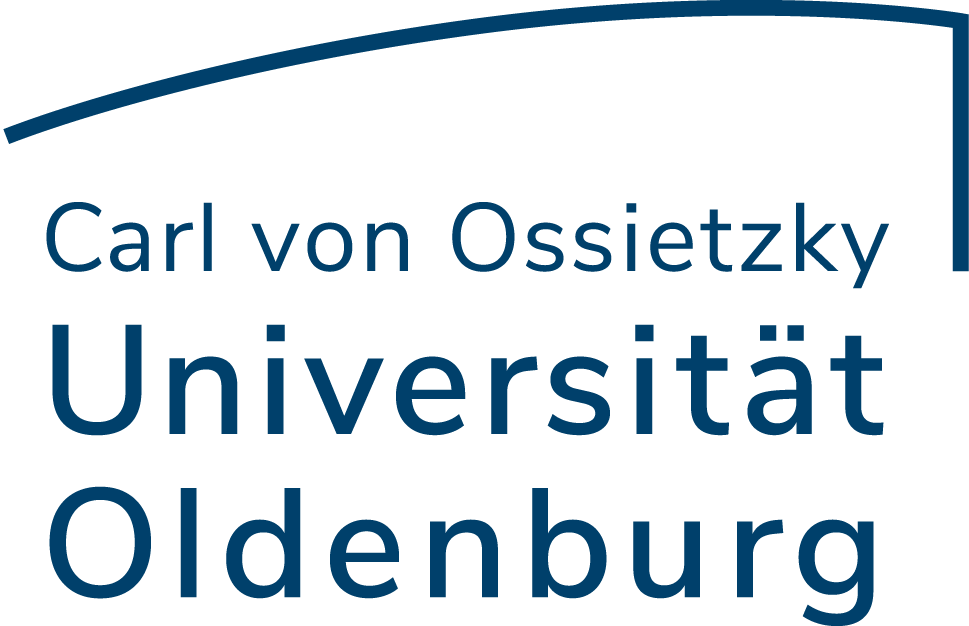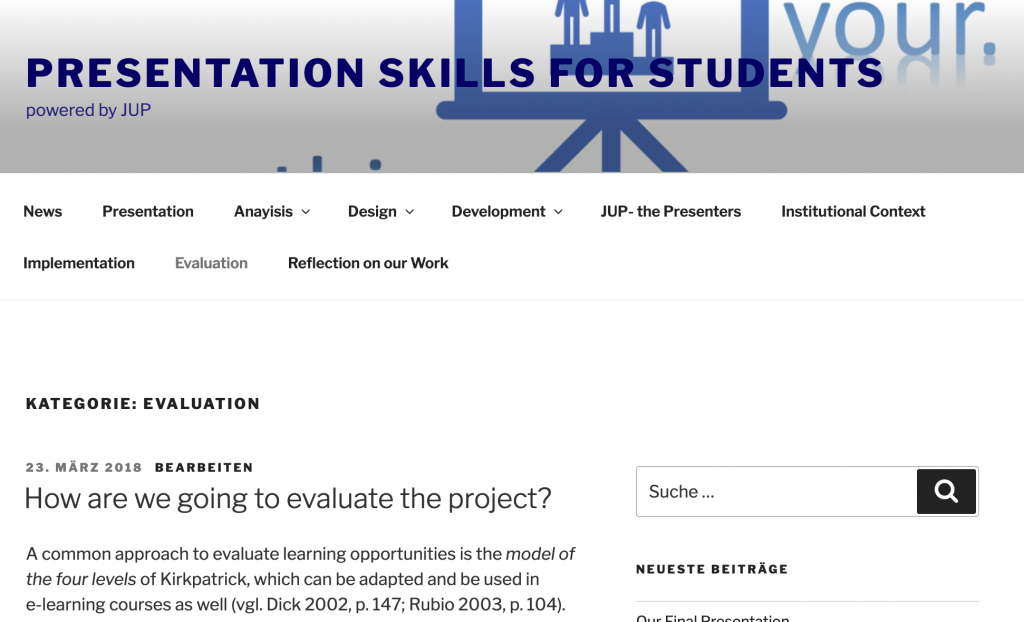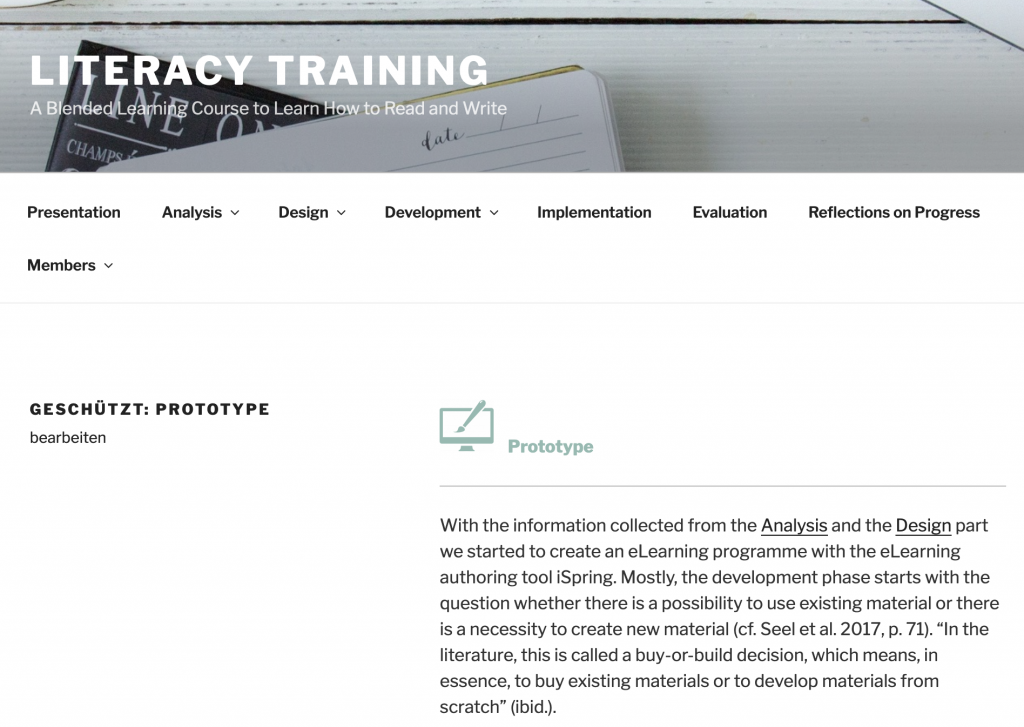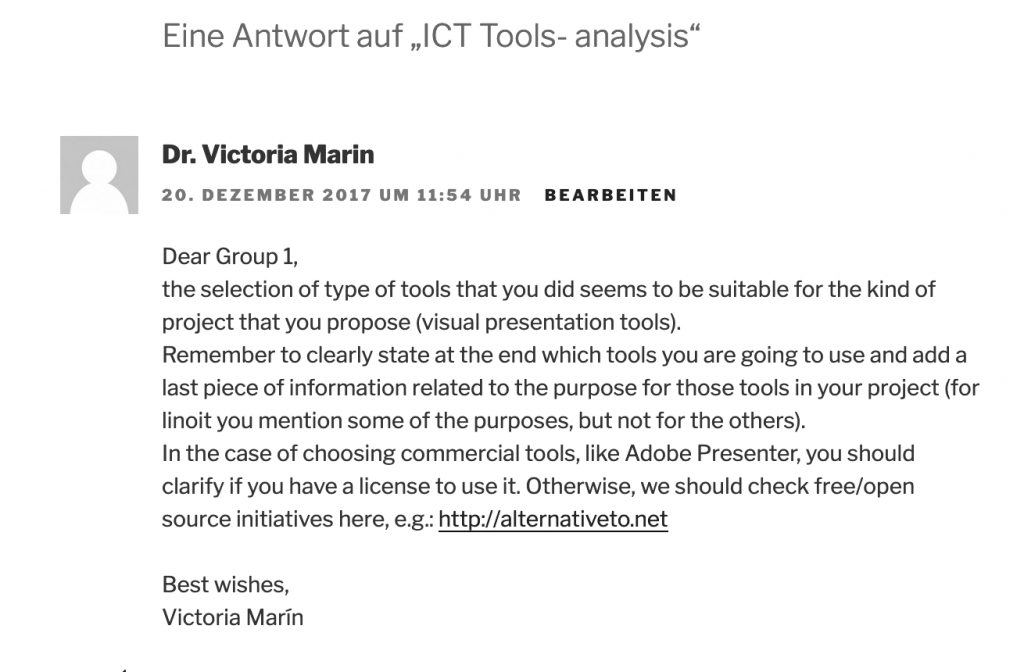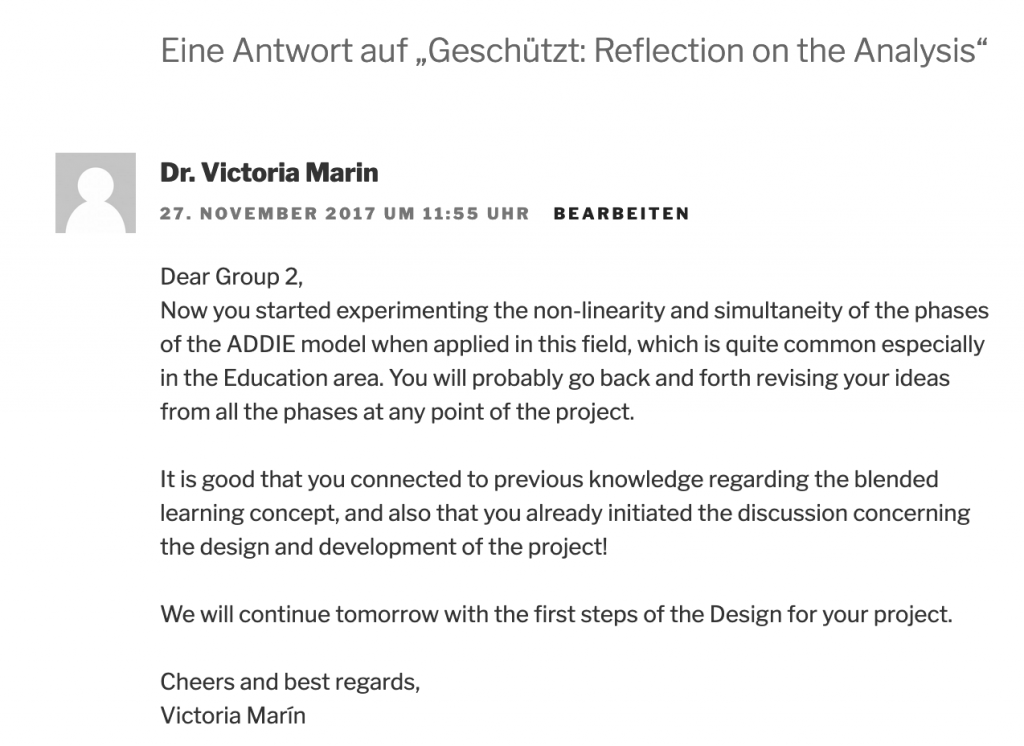Allgemeines
Lehrende:r
Dr. Victoria Marín

Veranstaltung
Instruktionsdesign, Methoden und Modelle des E-Learning
Modul
päd919 Instruktionsdesign
Studiengang
Master Erziehungs- und Bildungswissenschaften, Spezialisierung Lebenslanges Lernen/Bildungsmanagement
Fakultät
I – Bildungs- und Sozialwissenschaften
Institut
Pädagogik
Turnus
Variabel (am Anfang wöchentliche Sitzungen, in der Projektphase zweiwöchentlich mit eingestreuten Präsentationsmomenten der Ergebnissen)
Anzahl Studierende
15
KP des Moduls
9 KP
Prüfungsform
Projektportfolio (im Seminar), Hausarbeit oder Referat mit Handout und Ausarbeitung
Kategorien
Bildungswissenschaften und Pädagogik
Blog
Digitale Medien
E-Portfolio
Forschendes Lernen
Projekt
Seminar
Short Description
In this seminar, the main methods and models of instructional design in e-Learning were covered from a theoretical perspective but, mainly from a practical projection through group project work, following a research-based learning approach. The main aim of the course was that students develop competencies to design and develop an e-Learning product that could be implemented in a real situation. Therefore, students were guided during the course in the process of designing and developing an e-Learning concept and product through the instructional model ADDIE: students were able to analyse learning needs, define learning objectives and contents, design a concept for an e-Learning product (e.g. a course) and develop that idea choosing from a broad range of technological tools. Suggestions for the implementation and the evaluation of the project were also covered. The different phases of the project were to be developed by each group collaboratively in a group WordPress blog as a group e-Portfolio. A seminar blog and a concept map about the contents of the course based on the project-based work guided students in the different phases.
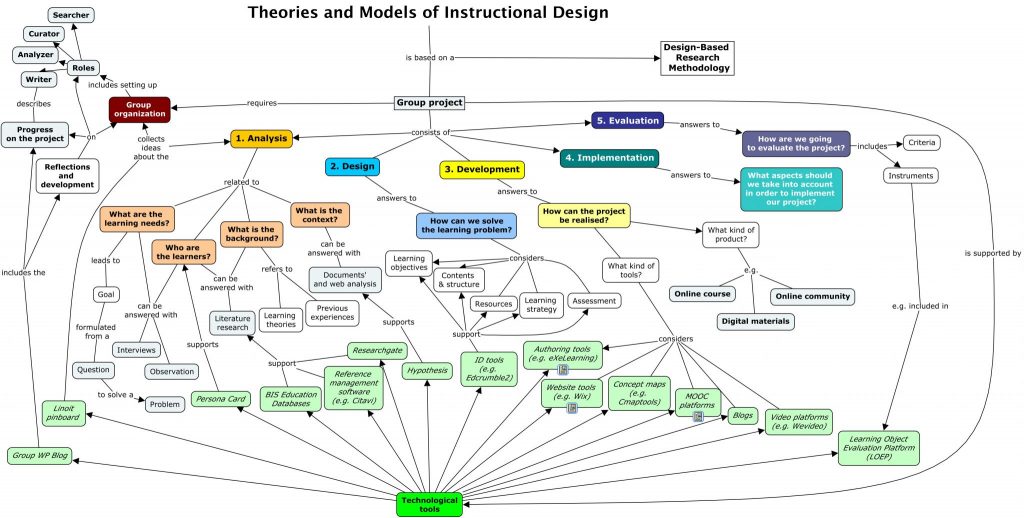
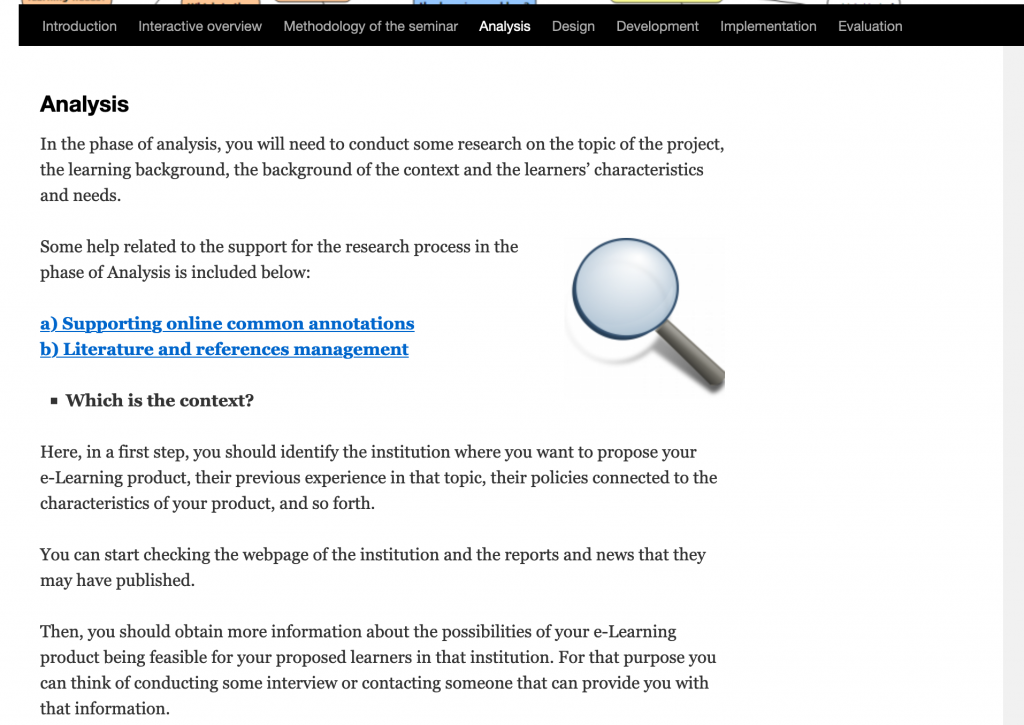
Students’ Activities
Face-to-face phases of theoretical input (most common at the beginning of the course) were gradually more often combined with the practical work in the project and oral presentations in class of the partial and final progress. During the phases of practical work and theoretical input, formative feedback was given both from the teacher and the peers in face-to-face situations, but also through the group WordPress blogs with the comment function. Students were supported with background information on instructional design and e-Learning both in class and through the seminar blog with tips for the questions and possible tools to use for each of the phases to work on. The students were encouraged to organize themselves in groups and establish different responsibility roles within (the searcher, the curator, the analyzer and the writer).
First in each group an interest was defined, and a research literature related to the topic was conducted –previous existing educational experiences, possible educational tools, and so on. In this first phase of Analysis, the students were expected to check the context for which the project was thought. In two face-to-face sessions, the students presented their progress on the project and were scaffolded to better define their objectives, choose the more suitable technological support and presentation or take further decisions to move forward.
Students used all that information to design and develop different e-learning projects (in total 5 group projects were developed- based on websites, online courses/groups or an e-learning multimedia material) for different contexts (the University, a VHS and an Employers’ Training Centre). Group WordPress blogs were not only used to present group projects but also as a communication and teamwork platform for documentation. Also, reflection during the progress of the work and at the end was part of the group work in the e-Portfolios.
Assessment
The groups’ e-Portfolios were the object of the assessment. A list of the criteria of the project to be considered in the evaluation was provided to the students. These included: the presentation of the project in the blog, the oral presentation of the project (the final one), the quality of the project (e.g. inclusion of all the aspects well covered, use of suitable literature references, coherence with learning objectives), quality of the materials developed (prototype) and the reflection on the work done. Reflection should include personal and group reflections, making the division of roles and tasks within the group explicit. A list of possible reflection prompts was included:
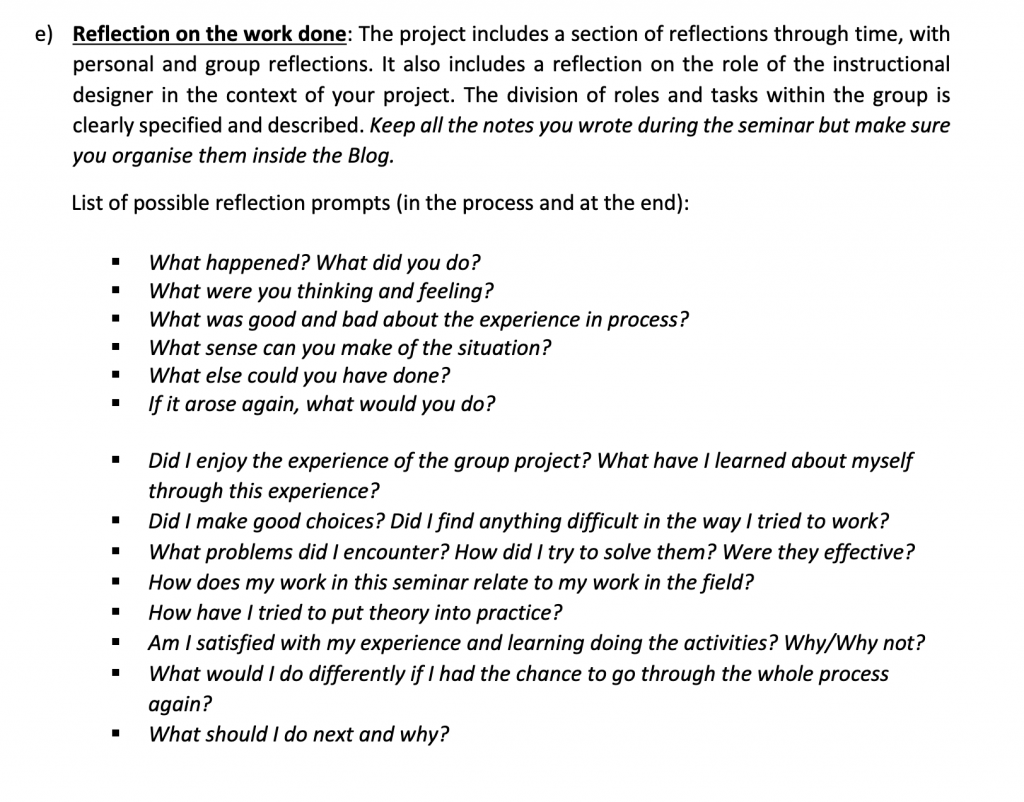
Reflection on the Teaching Concept
The project-based work in group WordPress blogs as e-Portfolios was in general well appraised by students, especially considering that they were confronted to this work almost every week face-to-face, could solve technical and subject-based doubts and questions, and received regular feedback on their work. The generated products (e-Learning concepts and protypes) met, and in some cases even exceeded, the expectations and objectives of the course.
The most valued aspect about the work done was the combination of theory and practice in the project, learning by doing. Doing it in a group WordPress blog supported students to develop their digital skills throughout the course, although it was also acknowledged that sometimes was time consuming and difficult to use. This was especially true at the beginning of the course, when most of the students started to familiarize themselves with WordPress and needed more guidance and support (beyond the initial introduction to the tool).
Although peer feedback was encouraged through the comments’ function of the group blogs, which were visible to all the groups, no activity from students in that sense emerged. However, this peer feedback appeared during the oral presentations in class and in informal exchanges between the students. It was also clear, that the groups checked from time to time the others’ group blogs to get inspiration and see if they were on the right path.
In case collaboration between groups is desirable, it may be a good idea that it forms part of the evaluation. In order to reduce the steep learning curve for using WordPress at the beginning, more concrete small steps to develop the project work could be guided.
More
Marín, V. I. (2020). Research-based learning in education studies: Design inquiry using group e-Portfolios based on blogs. Australasian Journal of Educational Technology, 36(1), 1-19. https://doi.org/10.14742/ajet.4523
